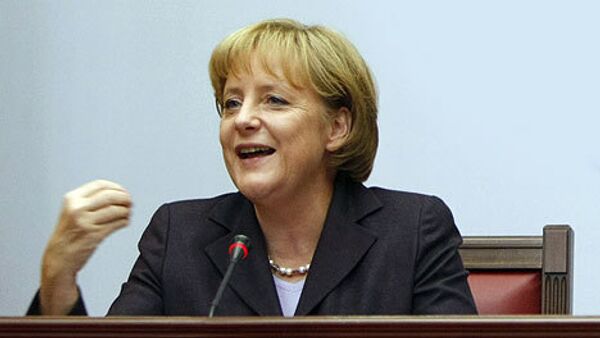MOSCOW. (RIA Novosti political commentator Andrei Fedyashin) - Local elections will be held in five German provinces on August 30, and Bundestag elections will be held on September 27. These elections will decide who will govern Germany for the next four years.
Although the election campaign is in full swing, the current chancellor, Angela Merkel, has only recently returned from a vacation in Italy's South Tyrol.
The German political culture has never been too impassioned compared to neighbouring countries, but this year's elections are unusual even for Germany. Elections are less than two weeks away, and yet campaigning has not yet begun in earnest. It may mean that Germans have become disillusioned, which in the past meant that they vote either contrary to the overwhelming appeals, or not at all.
In light of this fact, the two leading parties of the Grand Coalition - Merkel's Christian Democrats and Social Democrats led by Frank-Walter Steinmeier, who have had a very uneasy marriage for the past four years - may part ways after the September elections.
The divorce may be scandalous, with Merkel winning the vote provided nothing unseemly happens in the remaining weeks before the election, which is highly unlikely. According to the EU statistics, Germany and France, considered the driving force of the European economy, are now emerging from the financial and economic crisis. Their economies have been growing for the past three months, even if by mere 0.3%.
The situation at the polling stations in Germany will depend on who was more disappointing to Germans - Chancellor Merkel or Foreign Minister Frank-Walter Steinmeier, who has been instructed by Social Democrats to fight for a majority in the Bundestag and the post of chancellor.
The two leading parties have not gained anything from their forced marriage. Many supporters of Christian Democrats say that Merkel, who they hoped would become a second Margaret Thatcher, wasted her time making unnecessary compromises, and changing her position on moderate European conservatism in the process.
This could have killed her chances for re-election if not for unexpected "assistance" from Steinmeier, who is doing even worse than Merkel. Social Democrats blame him for agreeing to cuts of state allocations for social projects, free-market reforms on the labour market, and other unpalatable decisions.
The result has been dramatic for Social Democrats. According to recent public opinion polls, Christian Democrats are 17%-20% ahead of Social Democrats in terms of popularity.
The audience survey service of ZDF, a public German television channel, claims that Christian Democrats may get 49% of the vote if they team up with the Free Democrats. Other pollsters say Merkel's party may get as much as 51%, more than enough for a comfortable majority in parliament.
As for the Social Democrats, they cannot hope to win more than 32%, even if they join forces with the Greens.
If Merkel's party wins, Germany will probably be less accommodating with its allies and partners, including Russia, especially in view of its nascent economic recovery. Merkel has been blamed for Germany's perceived lack of stature in international politics, something that is not entirely true.
Germans would like to use Russian gas, oil and other commodities, but also want Russia to show at least a modicum of respect for human and civil rights. Unfortunately, the latest events in the North Caucasus have not strengthened their optimism, which is crucial for German business's ability to continue joint economic projects with Russia and Russian investment in Germany.
Germany is unlikely to cancel the Nord Stream gas pipeline from Russia to Germany across the Baltic seabed, but it can certainly complicate things for the project.
The opinions expressed in this article are the author's and do not necessarily represent those of RIA Novosti.



